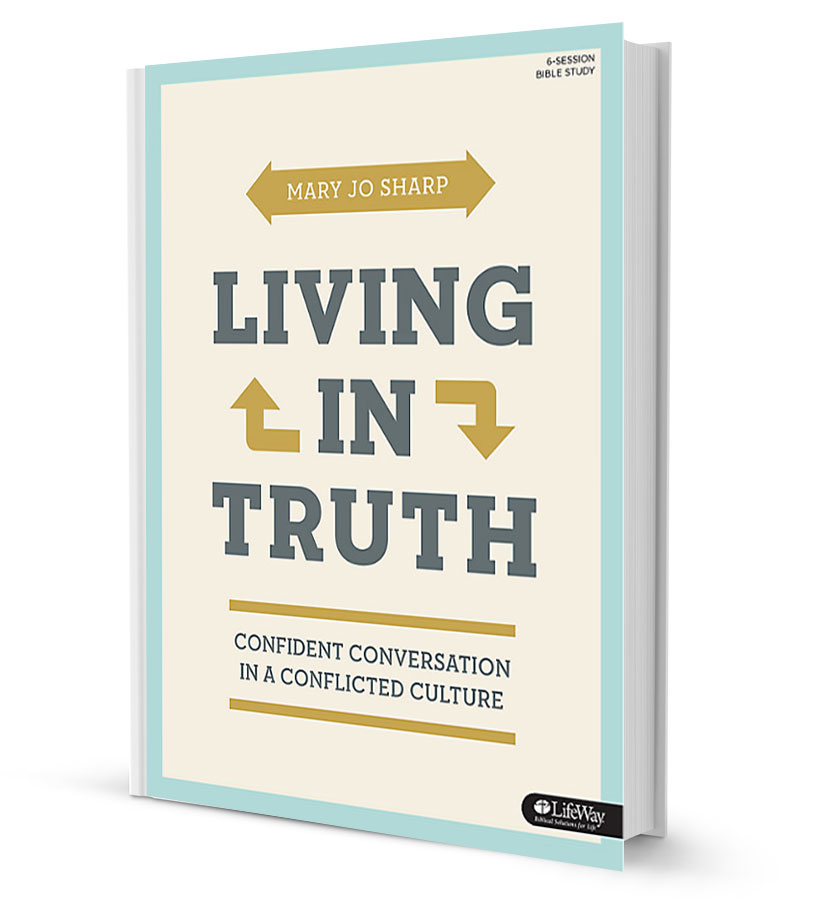
We’re becoming a culture that says there is no truth to be found about God. We also think that tolerance is about accepting every view as equally true but, realistically, with an exception excluding the Christian faith. Christians are rapidly becoming the target of secular media and aggressive atheist propaganda, marginalizing not just Christian beliefs, but also Christian people.
Living In Truth
False ideas within the body of Christ and the influence of culture crack our foundation of faith. Many women need to go back to the basis of their beliefs and strengthen confidence in their beliefs and in God.
The goal of this study is to help every Christian effectively converse on truth by following basic steps:
1) See the need for these conversations
2) Know what you believe
3) Listen to discover the cultural view
4) Learn to ask questions
5) Respond to false beliefs
6) Engage in a lifestyle of total truth
We’ve created brief introduction videos to each week, as well as an author invitation to the study. You can access each one for free at LifeWay.
NOTE:
UPDATE 8/24/2015:
From page 61, “Living In Truth”
The first error update goes to the negative example conversation on page 61. We have two problems:
1) Context: The conversation on Twitter was between a person representing an educational institution and a college student. The actual discussion was probably about a passage of contention in the Bible. The college student received a response on a particular passage of Scripture (thus the unicorn comment), but had retorted with the response that people interpret the Bible however best suits a particular argument. We see a series of comments a little out of order here. After “K” responds to the unicorn remark with “sounds good,” the institutional representative then proceeds to chastise her in general.
2) Editing error: The “S” statement should read: “What’s sad is that you only regurgitate commonly known sound bites without researching anything. Study. Do your homework. Make GA (Georgia) proud.” This is an ad hominem (an attack on the individual, rather than addressing her argument), to which the student replies, “You don’t know anything about me. Nice try with the personal insults.”
Raves
Amazon Reader Review
Rebecca Clark
There are two types of Christians I see a lot of today; One type are the people who are so caught up in what God says is sin that they can’t see past that to the love God wants us to show them. The other type of people are a little too much about the love; although they aren’t really showing them a true love.
What Christians need to do is somewhere in the middle and that is what this book teaches: how to have actual conversations with people about God. Conversations and not arguments. Conversations where both people are sharing their beliefs and why they believe the way that they do. Ephesians 4 says it perfectly: we should be “speaking the truth in love.”
Amazon Review from Shelf-Esteem
Do you look for openings in daily conversations to share your Christian faith? Perhaps you feel uncomfortable sharing such a "private" matter or fear being rejected, labeled, or laughed off. In her new study Living in Truth, apologist Mary Jo Sharp works to demolish the strongholds that keep Christians bound in silence. By using what we already know to be true from the word of God, and implementing some of Mary Jo's conversation starters and clarifying questions, study participants will be left feeling more confident and prepared to confront our culture with the truth in love.




